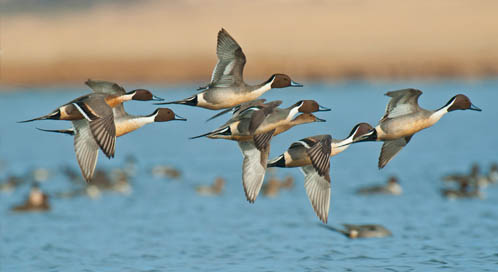Defenders fights to keep conservation funding in Farm Bill

© Tony Bynum / tonybynum.com
The prairie pothole region of the Great Plains is the most important and most embattled waterfowl habitat in North America, and it’s long had an ally in the United States Farm Bill—until recently.
The “potholes” of this grassland, stretching from Minnesota and Iowa through the Dakotas into Canada, are innumerable lakes and ponds formed by retreating glaciers. This corridor provides habitat for more than half of North America’s migratory waterfowl, including pintails, mallards, gadwalls, blue-winged teals, shovelers, canvasbacks and redheads. It’s also an important stopover for whooping cranes, lesser scaups, wigeons, green-winged teals and snow geese.
But agriculture has drained half of the region’s historical habitat, with some areas seeing 90 percent reductions. However, past Farm Bills have turned many farmers into wildlife conservationists by providing financial incentives to keep marginal lands unplowed and unplanted—protecting habitat for wildlife in the process.
These conservation incentive programs comprise a fraction of the bill’s total cost, but they frequently come up on the chopping block.
The latest version of the bill, passed by the House of Representatives in July, removes conservation subsidies while doling out almost a trillion dollars over five years to a diverse array of nutrition and agricultural programs, including lavish assistance and crop insurance contributions that benefit the wealthiest farmers. Taxpayers would pay the lion’s share of crop insurance premiums, which would encourage risky farming in otherwise ideal wildlife habitat.
The House bill also contains numerous amendments, or riders, to gut basic environmental protections and override long-established protections for clean water, healthy ecosystems and imperiled wildlife. For example, one rider would seriously undermine the Clean Water Act by allowing the direct application of pesticides to waterways without requiring federal permits. “More than a thousand lakes and streams are already too polluted with pesticides to meet clean water standards,” says Tim Male, Defender’s vice president of conservation policy. “This House bill is perhaps the most wide-ranging assault on the environment produced by this Congress.”
Additional riders would remove pesticides from restrictions under the Endangered Species Act, expand the powers of the Forest Service to sidestep safeguards typically provided by federal environmental laws and allow clear-cutting and road-building in nebulously defined “critical areas.”
An additional rider would exempt the Forest Service from monitoring stormwater runoff generated by forestry-related activities. If roads built to access and log remote “critical areas” pollute waterways, neither states nor the U.S. Environmental Protection Agency would be able to challenge them in court. “This would be another serious blow to the Clean Water Act with serious ramifications for the health of native fish like salmon, steelhead and trout,” says Male.
Defenders supports the Senate bill passed in June and is working to ensure its final passage by all of Congress. In contrast to the House’s conservation-crippling bill, the Senate version includes smaller cuts totaling $3.5 billion and subsidies that retain requirements for farmers to adopt environmentally sound practices—some of which have been in place on thousands of farms for two or three decades. The Senate bill also comes with much less extreme expansions of the Forest Service’s emergency logging rights.
—Matthew Hardcastle
